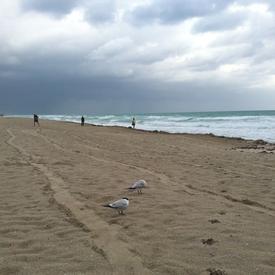Wine in cooking

Smuterella
Posts: 1,623 Member
Stoopid question alert:
If I add wine to say, a bolognese sauce, and the liquid mainly cooks off, do I still need to add the calories in?
If I add wine to say, a bolognese sauce, and the liquid mainly cooks off, do I still need to add the calories in?
0
Replies
-
i wonder this often. i think it must come down alot, perhaps on the level of vinegars.0
-
good question0
-
I always add it in. It's mostly the water and alcohol that are cooking out. Whatever is left still has calories so........0
-
i would just count it to be safe. the alcohol will burn away, but ethanol is not the source of calories.... all the sugars are, and they do not burn off.0
-
Add the calories for regular wine. Even when the wine is reduced in cooking, that is mainly alcohol evaporating but the sugar and starches are left behind. Alcohol evaporates but the calories don't.0
-
http://ikeepitoff.com/2009/06/wine-burns-off-during-cooking-answer-well-sorta…/
calorie reduction depends on how you cook with it0 -
I would plug the recipe in here (with the wine as an ingredient) and do it that way to figure out calories if you made the sauce yourself. If you are adding the wine to enhance a pre-made sauce I would add the calories of the wine separate just to be on the safe side. I prefer to over estimate calories of a dish if I don't know exactly how many are in it than to underestimate. Hope this helps??0
-
I do. What is actually cooking off is the alcohol and water...the other stuff remains. Although alcohol has calories, it is only about 13% of the wine. You could get technical and figure out how many calories are burning off and subtract them, but is it really worth the trouble? I don't think in the grand scheme of things, the amount of wine in your sauce is going to have a huge impact on the overall calories.0
-
Alcohol has a much lower boiling point than water. That means that when you use it when you are cooking and you heat it up to the point where the water starts boiling (high heat), then the alcohol is boiling away. The amount remaining depends on the temperature, how long you cook it and how much wine you put in, but if you put the wine in 'early' - you can probably assume that the alcohol conten remaining is negligible (if any) by the time your food is cooked. I was told by a chef that the amount remaining will vary anywhere between 5%-75% depending on the temperature, length of time cooking, and amount of alcohol. He said it was kind of just by "feel" - if you wanted more alcohol remaining, you cook at a lower temperature and add the wine later to the dish.0
-
This is a really interesting question!
When you cook with wine, unless you are simmering for hours, you can expect that you have still retained at least 70% of the alcohol you originally put in. Also, most of the calories in wine is in the form of sugar - This doesn't burn off with the ethanol, it remains in the sauce. Ultimately, the difference in calories from ethanol burnoff is probably not enough to get nitty-gritty with your calculations, I would add the entirety of the alcohol to your calorie allocation.0 -
Thanks all, I'd also rather overestimate. :-)0
-
100mL of wine which is 10% alcohol by volume has 10mL of ethanol.
10mL EtOH x 0.789g/mL = 7.89g
EtOH 7.89g EtOH x 7Cal/g = 55 Calories in 100mL of wine
That equates to 130 Calories of alcohol in a cup of wine (213 Calories total)
Now, if you simmer the wine for 30 minutes and have 35% remaining, then you have burned off 65% of the alcohol. This means that you burn off 6.5mL of ethanol for every 100mL of wine.
6.5mL EtOH x 0.789g/mL = 5.1g EtOH
5.1g EtOH x 7Cal/g = 36 Calories burned off from 100 mL of wine (54 Cal left).
That equates to 85 Calories burned off from a cup of wine, leaving behind 128 Calories for you to consume.
http://caloriecount.about.com/forums/recipes/happens-alcohol-calories-cook-wine0 -
100mL of wine which is 10% alcohol by volume has 10mL of ethanol.
10mL EtOH x 0.789g/mL = 7.89g
EtOH 7.89g EtOH x 7Cal/g = 55 Calories in 100mL of wine
That equates to 130 Calories of alcohol in a cup of wine (213 Calories total)
Now, if you simmer the wine for 30 minutes and have 35% remaining, then you have burned off 65% of the alcohol. This means that you burn off 6.5mL of ethanol for every 100mL of wine.
6.5mL EtOH x 0.789g/mL = 5.1g EtOH
5.1g EtOH x 7Cal/g = 36 Calories burned off from 100 mL of wine (54 Cal left).
That equates to 85 Calories burned off from a cup of wine, leaving behind 128 Calories for you to consume.
http://caloriecount.about.com/forums/recipes/happens-alcohol-calories-cook-wine
Ooh, Math. I am both impressed, educated....and a little turned on.0 -
copy and paste can make people seem so educated, but good advice0
-
copy and paste can make people seem so educated, but good advice
Don't rain on my flirt parade :-P0 -
Stoopid question alert:
If I add wine to say, a bolognese sauce, and the liquid mainly cooks off, do I still need to add the calories in?
the liquid doesn't cook off as much as you'd probably think...and in any case, you cant "cook off" the sugar in the wine...which is where the calories come from. If you're evaporating the alcohol and water in it...the sugar wont evaporate. It will stay in the bolognese0 -
Just for clarification, the "sugar" in a dry red wine is only 2 grams per 6 ounces. And total carbs are only 4 grams. Sugar is the main fermentation agent that get's converted into alcohol. In white wine it can be even less. In 8oz of a white wine I had Saturday night there was no sugar and only 2 grams of carbs. The total calories were 176 and most of that calorie load is mostly from the alcohol that evaporates off.
That being said, I wouldn't split the hair. I'd just add in the calories for whatever the volume is and if that's over, it's not by much. For the record, I am a professional chef who has cooked thousands of recipes and created a decent number also. When creating one, I would create the nutritionals as I described. Add in the volume and not worry about what it nets out to. PS: I am also an amateur wine maker and make 60 gallons per year. So I am familiar with the biochemical make up of wine, shall we say, intimately? LOL (yes I am a wino) Currently have a Lake County Red Zin in the barrel awaitng bottling.0 -
I find it helpful to review some of the alcohol cookoff charts that are out there. Some include time, temp, and method...others just time and method.
http://homecooking.about.com/library/archive/blalcohol12.htm0 -
Just for clarification, the "sugar" in a dry red wine is only 2 grams per 6 ounces. And total carbs are only 4 grams. Sugar is the main fermentation agent that get's converted into alcohol. In white wine it can be even less. In 8oz of a white wine I had Saturday night there was no sugar and only 2 grams of carbs. The total calories were 176 and most of that calorie load is mostly from the alcohol that evaporates off.
That being said, I wouldn't split the hair. I'd just add in the calories for whatever the volume is and if that's over, it's not by much. For the record, I am a professional chef who has cooked thousands of recipes and created a decent number also. When creating one, I would create the nutritionals as I described. Add in the volume and not worry about what it nets out to. PS: I am also an amateur wine maker and make 60 gallons per year. So I am familiar with the biochemical make up of wine, shall we say, intimately? LOL (yes I am a wino) Currently have a Lake County Red Zin in the barrel awaitng bottling.
Though I appreciate your feedback, I'd like to point out 2 things
a) the amount of sugar in wine is highly variable, and not everyone opts for dry wine
b) not all sugars are fermentable, and it's actually impossible to have a completely dry wine that contains no sugar. Negligible amounts, sure...but none? Impossible.0
This discussion has been closed.
Categories
- All Categories
- 1.4M Health, Wellness and Goals
- 397K Introduce Yourself
- 44.2K Getting Started
- 260.9K Health and Weight Loss
- 176.3K Food and Nutrition
- 47.6K Recipes
- 232.8K Fitness and Exercise
- 456 Sleep, Mindfulness and Overall Wellness
- 6.5K Goal: Maintaining Weight
- 8.7K Goal: Gaining Weight and Body Building
- 153.3K Motivation and Support
- 8.3K Challenges
- 1.3K Debate Club
- 96.5K Chit-Chat
- 2.6K Fun and Games
- 4.6K MyFitnessPal Information
- 16 News and Announcements
- 18 MyFitnessPal Academy
- 1.4K Feature Suggestions and Ideas
- 3.1K MyFitnessPal Tech Support Questions












